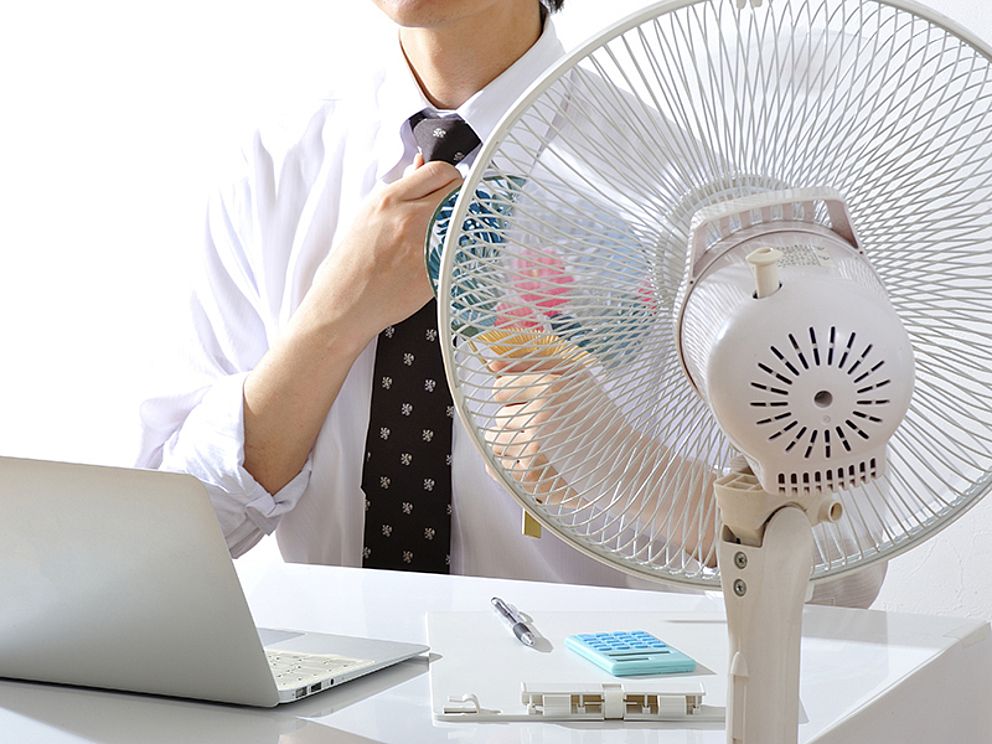Dry eyes: possible causes
Our eyes react sensitively to environmental irritants and diseases. Many people experience this occasionally or even daily through swollen, burning or reddened eyes. Dry eyes (medical name: sicca syndrome) can occur for completely different reasons. Here you have an overview of the most common causes of dry eyes.

Computer work and draughts are common causes of dry eyes.
Too few tears: dry eyes can have several causes
The surface of the eye is protected by a tear film which, among other things, ensures that the eyes do not dry out. When dry eyes occur, the lubrication of the eyes is reduced and thereby the surface of the eye is unprotected against environmental irritants. The dry eyes can hardly cope with the drainage of particles of dust or pathogens. Also, the cells in the surface of the eye are no longer supplied with sufficient oxygen or nutrients. Those affected notice that their eyes burn and itch, and some have the sensation that they have sand in their eyes.
Reduced lubrication of the surface of the eye happens either because the lacrimal glands produce too little fluid or because the composition of the tear film is disrupted. The latter leads to the tear fluid evaporating more quickly and a dry surface of the eye is the result.
Both causes of dry eyes can come about for different reasons, which are explained below.
Environmental influences
Fine dust, dry air in air-conditioned rooms or looking at a monitor for hours on end are environmental influences to which the eye reacts with dryness. The appearance of dry eyes resulting from intensive activity at a monitor is described as office eye syndrome. The problem: while you are staring at the monitor, you blink considerably less than is actually necessary. The tear film breaks up and the symptoms occur.
Inflammation of the eye
Inflamed eyes tend to dry out quickly. This most commonly affects the cornea, the conjunctiva and the eyelid. The eyes are greatly irritated due to the inflammation. Conversely, dry eyes encourage inflammation of the eye because germs can get into the eye more easily.
Impaired vision
Poor eyesight does not cause dry eyes, but certain behavioral patterns which arise with impaired vision can lead to them occurring. People with impaired vision usually strain their eyes a lot more when reading or driving. That leads to them forgetting to blink, such that the surface of the eye is no longer lubricated regularly with new lacrimal fluid.
Contact lenses are often worn to compensate for poor eyesight. But as these also have an influence on the tear film, they can also be a cause for the eyes to dry out.
Allergies
Allergies to pollen (normally called hay fever), animal hair or the excrement of household dust mites often manifest themselves with a runny nose and swollen, red eyes. The trigger for the allergy, also referred to as the allergens, cause an immune reaction in the eyes. The eyes run a lot but at the same time feel dry.
Diseases and medicines
Metabolic disorders, such as diabetes mellitus or illnesses of the thyroid gland, lead to different symptoms throughout the body. The eyes often dry out because the production of tears declines as a result of the disease. In addition, rheumatism can lead to pronounced symptoms of dry eyes. One rheumatic disease which directly affects the mucous membranes of the eye, is Sjögren’s syndrome.
Certain medicines can cause dry eyes as a side effect. Beta blockers, the contraceptive pill or antihistamines are only three examples from a series of drugs which can result in dry eyes if taken regularly.
Injuries to the eye, for example as a result of an eye operation, can also be the reason for dysfunctional tear production.
Hormonal changes
During your lifetime, your hormonal balance constantly changes. Women, in particular, sometimes experience severe changes in their hormonal balance. A pregnancy or the menopause are two of the biggest periods of upheaval. At these times, many women suffer from dry eyes, because the female hormone oestrogen has a great influence on tear production.
Also, the eyes get drier as we get older, due to changes in the hormonal balance and the cumulative occurrence of certain illnesses.
Continue reading to find out how dry eyes are diagnosed and how you can care for your dry eyes.
